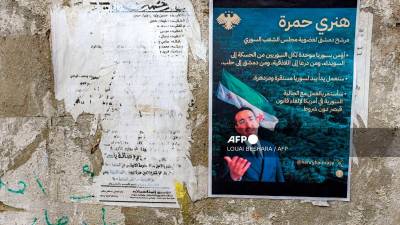
DAMASCUS: Syria will select members of its first post-Assad parliament on Sunday in a process widely criticised as undemocratic.
Interim leader Ahmed al-Sharaa will personally appoint one-third of the assembly’s 210 members according to the organising committee.
The assembly’s formation aims to consolidate Sharaa’s power after his Islamist forces toppled Bashar al-Assad’s regime in December.
More than 1,500 candidates are competing for positions in the new parliamentary body.
Only 14% of the candidates are women according to official statistics.
Sharaa will appoint 70 representatives directly while the remaining two-thirds will be selected by local committees.
These local committees were appointed by an electoral commission that Sharaa himself established.
The Druze-majority Sweida province and Kurdish-held northeast regions are excluded from the selection process.
These excluded regions account for 32 parliamentary seats that will remain vacant.
“I support the authorities and I’m ready to defend them, but these aren’t real elections,“ said Louay al-Arfi, a 77-year-old retired civil servant.
He described the process as a transitional necessity but called for direct elections to follow.
The new authorities dissolved Syria’s previous rubber-stamp legislature after assuming power.
A temporary constitution announced in March grants legislative functions to the incoming parliament.
This arrangement will continue until a permanent constitution is adopted and new elections occur.
Sharaa has defended the selection process by citing practical challenges.
He noted that millions of Syrians lack proper documentation after fleeing abroad or being displaced internally.
Approximately 6,000 people are participating in Sunday’s selection process.
Preliminary results will emerge after the process concludes with final names announced on Monday.
Candidates must not be supporters of the former regime under the selection rules.
They are also prohibited from promoting secession or partition of the country.
Syrian-American Henry Hamra is among those running as the first Jewish candidate since the 1940s.
Rights groups have strongly criticised the selection process for concentrating power.
They argue the system lacks proper representation for ethnic and religious minorities.
More than a dozen non-governmental organisations issued a joint statement last month.
They warned that Sharaa could shape a parliamentary majority through his appointments.
This risks undermining pluralism essential to genuine democratic processes according to the groups.
“You can call the process what you like, but not elections,“ said Bassam Alahmad of Syrians for Truth and Justice.
Candidate Mayssa Halwani acknowledged that criticism was normal during this transitional period.
“The government is new to power and freedom is new for us,“ she explained.
Nishan Ismail, a teacher in Kurdish-controlled northeast Syria, expressed disappointment.
He said elections could have represented a new political start after Assad’s fall.
The marginalisation of numerous regions shows political participation standards are not respected according to Ismail.
Negotiations on integrating Kurdish institutions into the central government have stalled.
Damascus has rejected calls for decentralisation from Kurdish representatives.
Activist Burhan Azzam in Sweida echoed concerns about the selection process.
He claimed the authorities have effectively ended political life in Syria.
The process doesn’t respect basic democratic rules according to Azzam’s assessment. – AFP
